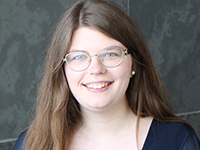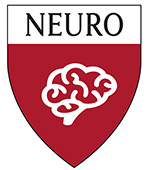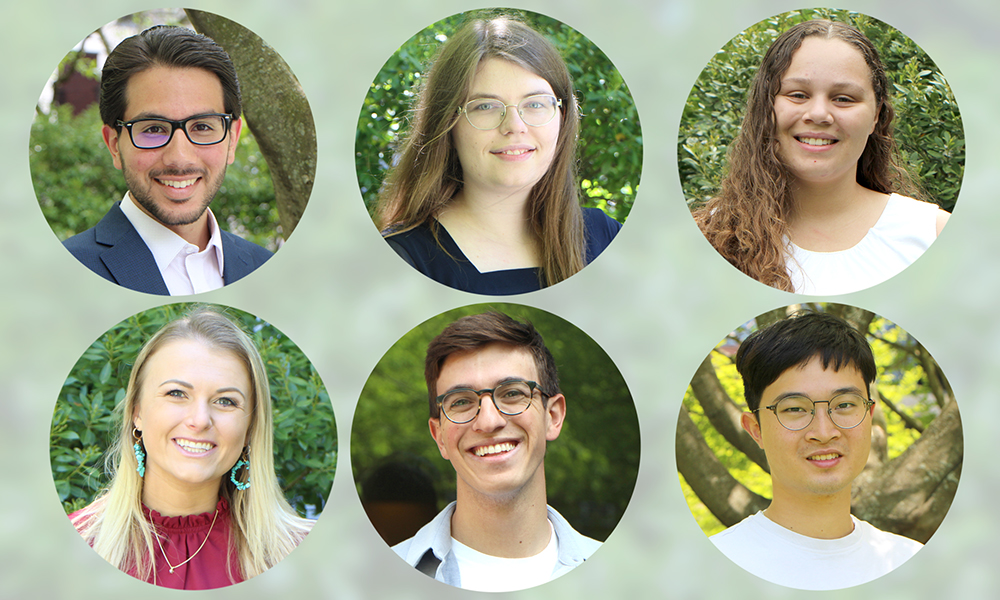Six neuroscience concentrators–Mohammed Abuelem, Catherine Gallori, Autumn Johnson, Rio McLellan, Lev Sandler, and Justin Wong–are among this year’s recipients of the prestigious Hoopes Prize. The university-wide award celebrates undergraduates who do outstanding scholarly work on their thesis projects.
This year, there were 74 Hoopes winners across all the concentrations in the college, and the six Neuroscience Hoopes recipients make up over 8% of the total this year.
Each Hoopes Prize recipient is awarded $5,000, and their theses are bound and made available at the Lamont Library for two years.
Read on to learn more about these students and their theses!

Mohammed Abuelem (Neuroscience with a Secondary in Global Health & Health Policy ‘23)
The Role of Juvenile Shank3 Re-Expression on Autistic-like Cognitive Flexibility Deficits in Male Mice
Mohammed Abuelem’s thesis project investigated an autism risk gene called Shank3 and its role in cognitive flexibility. Because people with autism often exhibit a lack of cognitive flexibility, Abuelem used a knock-in mouse model that activates Shank3 expression during an early developmental time window and examined how the mice performed on various tasks.
“We examined rule learning behavior, synaptic molecular composition in key brain regions involved in cognitive flexibility, and resting-state whole-brain activity patterns,” Abuelem explains. “Our results characterized a role for juvenile Shank3 expression in cognitive flexibility behavior, highlighted a novel synaptic protein relationship involving SHANK3, and elucidated neural activity dynamics reflecting Shank3 expression levels that may underlie autistic-like cognitive flexibility deficits.”
Abuelem conducted this work in the Hensch Lab at the F. M. Kirby Neurobiology Center at Boston Children’s Hospital and the Center for Brain Science at Harvard University. He adds that he is grateful for MCB faculty Takao Hensch’s mentorship and support.
In the fall, Abuelem will read for a Master’s by Research in Physiology, Anatomy, and Genetics at the University of Oxford. He plans to continue on to medical school after that.
“I would like to thank all the members of Dr. Hensch’s lab and Dr. Fagiolini’s lab for supporting my research efforts and guiding me throughout the process,” he says. “I would also like to extend my appreciation to my neuroscience concentration advisor Dr. Ryan Draft, and I would like to acknowledge Members of the Standing Committee on Mind, Brain, & Behavior for selecting me as a Mary Gordon Roberts Research Fellow, along with the Office of Undergraduate Research and Fellowships for financially supporting my summer research efforts through the Harvard College Research Program. I am also grateful for the tremendous love and support from my family and friends.”

Catherine Gallori (Neuroscience with a Language Citation in Italian ‘23)
Two major brainstem outputs for interoception
Catherine Gallori’s thesis research centered on how the brain senses internal organs through a process called interoception. “Much of our internal sensory information travels up the vagus nerve into a brainstem region called the nucleus of the solitary tract (NTS), which processes and sends that information to other regions across the brain,” Gallori explains. “But internal sensory (or interoceptive) information is incredibly varied and regulates a huge range of behavioral and physiological responses on multiple levels. How the NTS organizes and sends interoceptive information to the right places to appropriately regulate behavior and physiology has been unclear.”
When she investigated the NTS, Gallori was able to identify at least two major output streams that send information to different areas of the brain. Each of these output streams appears to regulate different behaviors and physiological processes.
Gallori conducted her thesis research in Stephen Liberles’s lab at HMS, where she worked with postdoc Chen Ran and graduate student Yandan Wang. She plans to remain in the lab next year in order to follow up on her initial findings and apply to MD/Ph.D. programs.
“I can’t thank Dr. Liberles & Dr. Ran enough for their incredible support throughout the thesis writing process, and Yandan as well for the amazing work she did,” Gallori says. “I’d also like to thank the rest of the Liberles Lab for all of the advice, training, and support they have given me over the past few years. I feel so lucky to have had the chance to work with such caring and supportive people, and I can’t thank them enough for continuing to inspire my love for science. Finally, a big shout-out to my family and friends for keeping me sane throughout the whole process.”
When it comes to navigating a thesis, Gallori advises other students to take it one step at a time. “Don’t be intimidated by the thesis process!,” she says. “It can feel like a huge project, but the written thesis itself isn’t as long as you might think, and if you start your work over the summer you’ll have more than enough time to produce something you can be proud of. My second piece of advice is to choose your lab carefully—the support that I got from my immediate mentor, my PI, and the other members of the lab was probably the important factor in making the thesis process manageable and overall a really fun and rewarding experience. Finally some technical advice: take advantage of the free Adobe Illustrator and Prism subscriptions—you can easily make some very pretty figures with them.”

Autumn Johnson (Neuroscience with a Secondary in Women, Gender, and Sexuality Studies ‘23)
Touch as a Key Regulator of Social Need
Autumn Johnson conducted her thesis research in the Dulac Lab with guidance from postdoc Ding Liu and research assistant Samantha Finkbeiner.
“My thesis project sought to investigate how the sensation of physical touch contributes to the drive for and satiation of social need in mice,” Johnson explains. “Preliminary work in our lab shows that social need is regulated in a homeostatic manner similar to our needs for water, food, and sleep. We proposed that physical touch is the way in which these animals understand whether they are alone or together, and my thesis was focused on manipulating touch sensation to see how it affects the drive and fulfillment of the crucial need for social interaction.”
Doing a lab-based thesis project has proved to be a valuable learning experience. “My time in the lab has taught me the values of patience and self-assurance,” Johnson says. “Research does not always go the way you plan, but these experiences present us with opportunities to learn and improve our work. Having faith in yourself and that you are doing the best you can will carry you through those times. Lastly, when in doubt, ask for help! Learning does not only take place in the classroom or behind the bench.”
Johnson expressed gratitude toward her collaborators and supporters in the department. “I would like to thank Catherine for her support and for granting me the opportunity to work in her lab; Ding for his mentorship and for encouraging me to have faith in myself; Sam for always being ready to help at a moment’s notice, and our lab administrator Lianna Doan for making sure I stayed well-fed and supporting me throughout my time in the lab,” she says.
In August, Johnson will join Ralda Nehme’s lab at the Broad Institute as a Research Associate. Her long-term goal is to pursue a Ph.D. in neuroscience.

Rio McLellan (Neuro with a Secondary in Philosophy ‘23)
Targeting Proteostasis Machinery in the Brain Vasculature to Treat Neurodegenerative Disease
Rio McLellan is passionate about investigating neurodegeneration. She conducted her thesis research in Lee Rubin’s lab in SCRB (Stem Cells and Regenerative Biology), where she looked into the effects of elevating heat shock protein levels in blood vessels near the Blood Brain Barrier (BBB).
“Heat shock proteins are a special kind of molecular chaperone–proteins involved in refolding misfolded proteins and degrading protein aggregates,” McLellan explains. “Brain endothelial cells that line the vasculature are harmed by toxic protein aggregates present in many neurodegenerative diseases. This cellular damage contributes to the breakdown of the blood-brain barrier, which is considered an early pathological event in Alzheimer’s disease, Parkinson’s disease, and ALS.”
McLellan’s experiments suggested that raising levels of heat shock proteins in the brain’s blood vessels reduced the amount of damage done by protein aggregates. “We found evidence to suggest that increasing levels of heat shock proteins in these cells is protective against aggregation-related toxicity. Ultimately, I hope my thesis sheds light on how the brain vasculature plays a crucial, yet understudied, role in brain health and disease.”
McLellan’s thesis also won the Dowling Prize, which recognizes outstanding undergraduate thesis work in neurobiology.
In the fall, McLellan will begin working on her Ph.D. at The Rockefeller University in New York. “There, I plan on continuing my studies on brain aging and neurodegeneration, with the long-term goal of contributing to the discovery of innovative therapeutic approaches for neurodegenerative diseases,” she says.
McLellan adds that her thesis research was one of the highlights of her college career, even though it was quite challenging at times. “Don’t worry so much about how your thesis is going to turn out!” she advises younger students. “Just give it all you got and I promise you’ll be proud of what you have at the end of your college career. Writing a senior thesis was the most difficult and rewarding experience I had at Harvard. Wouldn’t change it for the world!”

Lev Sandler (Neuroscience with a Secondary in Global Health & Health Policy and a Language Citation in American Sign Language ‘23)
Interplay of alpha-Synuclein and Mitochondrial Bioenergetics in Parkinson’s Disease
For his thesis research, Lev Sandler looked into how accumulation of a protein called alpha-synuclein affects mitochondria. Alpha-synuclein build-up is associated with diseases such as Parkinson’s. “While decades of Parkinson’s Disease research have implicated the mitochondria and mitochondrial dysfunction as critical features of the disease, this dynamic is still not well understood,” Sandler says. “The major aim of my thesis was to characterize this protein-organelle interaction using a bioenergetic approach.”
Sandler conducted his thesis work in Vamsi Mootha’s lab and worked with postdoc Tsz-Leung “TL” To. “I am immensely grateful to Professor Vamsi Mootha and Dr. TL To for their exceptional support and guidance throughout this entire process,” Sandler says. “Their mentorship went above and beyond what I could have imagined, making me feel incredibly valued and appreciated as a member of the lab. Being a part of the Mootha Lab has had such a positive impact on my college experience and I will miss everyone there very much next year.”
Sandler adds, “I also want to thank my friends, family, the neuroscience department, and the Harvard Callbacks for always cheering me on and encouraging me to believe in myself not only while writing this thesis but throughout my four years at Harvard. This accomplishment would not have been possible without you all!”
In his thesis experiments, Sandler isolated mitochondria and primary neurons and exposed them to an alpha-synuclein treatment, which increased reactive oxygen species (ROS) in the cells. “Alpha-synuclein treatment also caused direct disruptions to the electron transport chain that were notably alleviated with cotreatment of the anti-diabetic drug metformin,” he explains. “My results suggest that these disruptions to mitochondrial and cellular homeostasis may be one of the underlying drivers of Parkinson’s Disease pathology.”
After graduation, Sandler will attend medical school at the Icahn School of Medicine at Mount Sinai.
“My advice to younger students would be to find the communities here that feel like family,” he adds. “Whether it is your House, concentration, extracurricular, or otherwise – the people you meet and the relations you make will define your experience here. Take the time to find the people you love–your four years will be all the better for it!”

Justin Wong (Neuroscience & Philosophy ‘22)
Hypersensitivity: The Impact of Altered Sensory Circuits on Cortical Development and the Implications for Autism Spectrum Disorder
Justin Wong, who graduated in December 2022, wrote a thesis that combined lab experiments with philosophical discussion about the principles that guide neuroscience research on autism.
While a lot of attention around autism centers on social behavior, Wong chose to investigate sensory issues. This choice reflects the fact that many autistic people in online spaces have called for less emphasis on social “deficits” and more attention to painful and disruptive touch sensitivities.
“My thesis, which was also submitted to the philosophy department, is focused on the sensory aspects of autism,” Wong says. “With a mouse line with a conditional deletion of Gabrb3, an ASD-related gene, I studied how sensory abnormalities on the skin, which are widely reported by autistic people, may alter the protein expressions, connections, and activation patterns of neurons in the brain, highlighting the role of peripheral sensory inputs in brain development. Furthermore, my thesis introspectively discusses how a pivot in focus from cognitive deficiencies to sensorimotor differences can provide a form of science that better captures the lived experiences of autistic people.”
He conducted the wet lab portions of his thesis in Lauren Orefice’s lab at Massachusetts General Hospital, with mentorship from postdoc Charline Kambrun. “It’s hard to fit a one-page acknowledgment into a couple of sentences, but I would like to thank everyone (both inside and outside the lab) who helped make my thesis writing journey become such a great learning experience,” Wong says.
Wong plans to continue building his interdisciplinary expertise by pursuing a JD/Ph.D. at Harvard this fall. Along with the law degree, he will work toward a Ph.D. in Public Policy and Science, Technology, and Policy studies. “I hope to focus on the laws that govern science and medicine and create a richer understanding of how scientific and medical knowledge and technologies are created, integrated into society, and challenged,” he says.
Reflecting on his thesis research experience, Wong reminds future thesis-writers that an undergraduate thesis is not the end-all-be-all of an educational journey. “The thesis, much like your undergraduate years in Harvard, is a part of a much longer learning process,” he says. “Along the thesis writing process, there were a few occasions when I was very stressed about the thesis, feeling overwhelmed by the edits I had to make or the mistakes I made. Looking back, neither the thesis nor the degree is the crowning moment of my education, but they have led me to find where my interests lie and helped me plan for them. In the end, even though my thesis did not generate any significant results, I still learned a lot from the process.”





